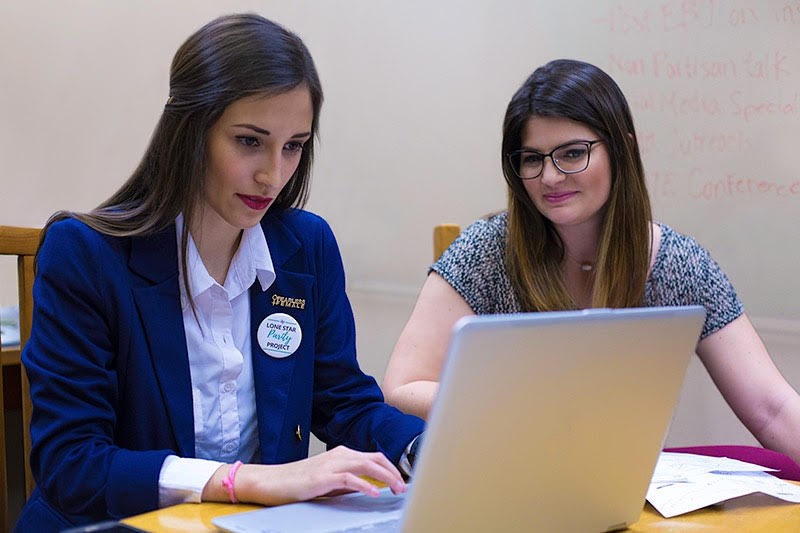Jennifer Edgeworth, a mother and attorney, ran in an unopposed general election this past November and has now secured a seat as the seventh female judge on a bench of eleven district judges. Judge Edgeworth has made history by making Collin County home to one of the only district courts in Texas tipped in the favor of women. Newly elected State Representative Candy Noble filled the vacated 89th Texas House District seat in November as well. Representative Noble directly preceded Honorable Jodie Laubenberg, a Republican woman who served in that office for almost two decades. All are women who have become trailblazers for women in Collin County politics; all are women who have led the way for gender parity in Texas.
Collin County is the 6th largest county in the State of Texas, serving an ever-growing population of 969,000 people. Out of the 38 officials that make up the countywide electorate, 12 of the seats are held by women. It is one of the only counties in Texas that has a majority-female electorate. With women only serving in 20% of elected office nationwide, representation for regional offices (State Senate, State House, Congressional Districts, US Senators) for the area
is on par at 21% with 3 of 14 representatives being women. But looking at Collin County representatives specifically, women surpass the national average by serving in 32% of countywide elected office.
This is no small feat; other populous counties in Texas have yet to reach political gender parity. Unlike other Texas counties, women running for office in Collin County are able to utilize a long-founded structure of political power, harnessed in the steadily-expanding, suburb communities. Organizations such as the Golden Corridor Republican Women’s Club harness its far-reaching community influence to guide many women candidates in Collin County to success, like Judge Edgeworth and Representative Noble. These long-standing, empowering organizations, built by
women supporting other women, allow Collin County to stand out among the rest.
While Collin County leads the Lone Star state in gender parity, the county falls behind in other avenues of diverse representation. In the 2016 Presidential election, voters turned the county purple with 58% of residents voting Republican and 41% of residents voting Democratic yet there are currently zero Democratic elected officials; all countywide officials are Republican. Additionally, 42.7% of the Collin County population consists of people of color yet out of 38 countywide elected officials, less than 3% identify as such; out of all of the municipal governments encompassed in Collin County, less than 10 of the total councilmembers are people of color – only one of them being a woman. Interestingly, a majority of the candidates who identify as Republican in Collin County tend to be Anglo-American (or “white”). While the candidates who identify as Democratic in Collin County tend to be more diverse in racial and sexual identity, a majority of the candidates are still “white”. Collin County is seeing one of the most disproportionately “white-washed” electorates in comparison to the actual demographic makeup of the County.
Finally, there are no openly, self-identified members of the LGBTQIA+ community serving in countywide elected office. Other aspects of representation, like socioeconomic status, education attainment, disability inclusion, and religious affiliation, are difficult to quantify, due to a lack of aggregated information on candidates. With Collin County becoming one of the fastest growing communities in Texas, it is essential for the County’s electorate to actively represent all of the identities in its diverse population.
Not only does an electorate need an even number of men and women serving in office but there needs to be a proportional representation of other co-mingled, intersectional identities. When women from a variety of backgrounds serve in elected office, valuable voices are brought to the conversation; fresh insight can be given to outdated policy and new policies can be crafted through a contemporary lens. And these policies aren’t just limited to “women’s issues” —
women in elected roles are able to give personal perspective on all policies, including those dominated by men like STEM and transportation.
Dallas County presents one of the most diverse electorates at the state and county level. Harris County, encompassing the city of Houston, shook the nation after a viral photo of 17 African-American women judges, stood before the world as newly elected members of the countywide bench. So why is Collin County’s electorate lacking diversity, falling behind other quickly growing communities in Texas? There isn’t one distinct reason – but one can speculate as to why the Collin County electorate has been slow to accept diversity. Collin County subscribes to the typical “good ole boy” political hierarchy. It can be difficult to enter a political scene steeped in tradition when you represent identities that are “new” to the area. Collin County must continue producing diverse candidates and voters must begin opening their ballots to the possibility of diversity.
Collin County has to shift their political electorate to match its growing, diverse population. Voters should begin to not only invest their time in women candidates but also a wide variety of candidates ranging in ideology, ethnicity, income levels, and sexualities.
Lone Star Parity Project

Brooke and Adrianna are co-founders of the Lone Star Parity Project, a 501c(3) nonprofit, nonpartisan publication and research site dedicated to women and femmes in Texas politics. To learn more about the Lone Star Parity Project, visit us at www.lonestarparityproject.org or email us at [email protected].




